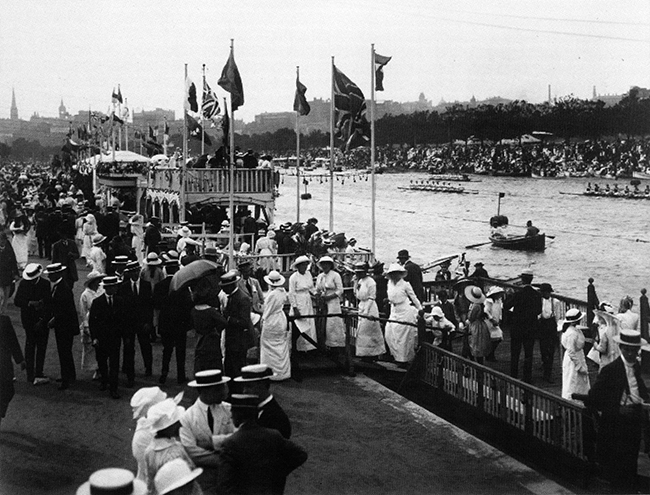Norman L Johnson
Mercantile Rowing Club (VIC)

Above: Norman in his winning junior eight at Henley 1914
Norman was one of six Mercantile members who died in WWI. Three of them came from just one junior eight which won at Henley in 1914, the last full season before the war. The three were: William Cumberland, Norman Nation and Norman Johnson.
This crew obviously enjoyed their rowing and the company of each other. They had won the maiden eight double at Upper Yarra and Albert Park Lake Regattas in the previous season and had kept together through winter to race at the junior level in 1914.

Above: Australian Henley in 1914
Henley regatta in those days was not only then first major regatta of the season in late October, but also the biggest and most prestigious non Championship regatta in Australia.
WWI not only devastated the next generation of oarsmen in Mercantile, but throughout Australian rowing.
The impact of their loss on the club and his crew mates was severe. In the 1921-22 season, three new fours were named in the honour of these three friends.
Norman was the son of Robert and Catherine Johnson of Lucas Street Caulfield. Prior to joining the Australian Imperial Forces for service abroad, he had served three years six months in the Australian Infantry Regiment where he rose to the rank of Second Lieutenant. He joined the Australian Imperial Forces on 27th February 1916 at the age of 27 years. He was 5′ 9″ tall and of dark complexion. His religion was noted as Church of England and his occupation as a clerk. Despite being single, correspondence on his file from a Miss Sybil Levi of Princes Street St Kilda and Miss D Myers of 396 Punt Road South Yarra indicates others outside the family had a clear interest in his welfare.
In the AIF, he was promoted to Lieutenant on 21st March 1916, then Captain on 3rd May 1917.
He obviously continued his interest in sport whilst overseas as his belongings included a pair of swimming trunks and a tennis racket. Also of interest was included in his belongings, a German gas mask and his own Enfield revolver (not government property.)
Sadly he was badly wounded on the evening of Sunday 16th December 1917 whilst bringing his company out of the line from a position east of Messines. He had his company out and was returning their gum boots back to the store. A shell hit the store and he was would badly injured in the legs with the left leg shattered. Despite being given immediate first aid and being transferred to a central casuality station by ambulance, he died of his wounds two days later.
Andrew Guerin April 2017

